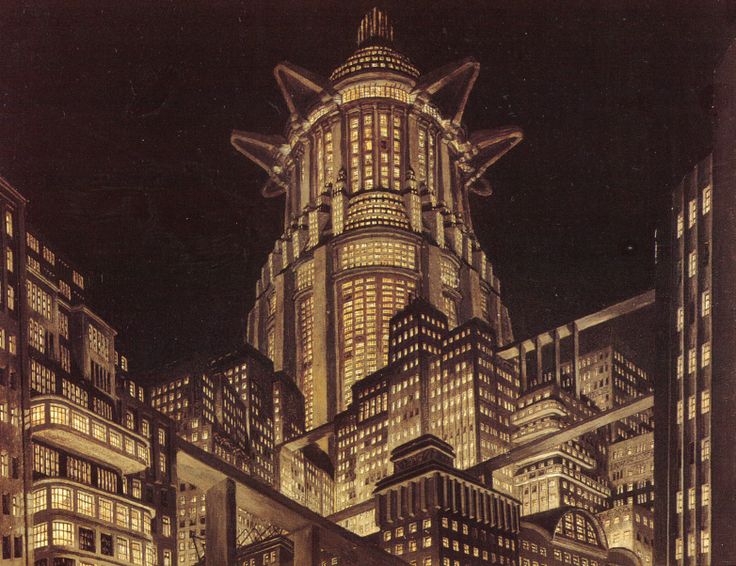Erich Kettelhut was born in Berlin, Germany in 1893. He attended craft school and trained to become a theater artist, which involved drawing the backdrops for movies (before CGI existed). He painted Metropolis: Tower Of Babel as concept art for a movie of the same title. During the Nazi regime he worked with several German directors, but this sapped his passion for art and film, and he retired for five years after the second world war. He died in March of 1979.
Metropolis: Tower of Babel
In this piece, Kettelhut re-imagines the Tower of Babel as a modern skyscraper rising above a contemporary skyline. The contrast between the modern tower depicted in the oil painting and the primitive tower constructed by prehistoric man described in the Bible draws attention to just how far humanity has progressed since the biblical passage was written. Additionally, the point of view of the painting (that of a spectator looking up from street level) makes the tower seem even taller and more imposing than it would from a more distant point of view. This perspective also differs from many other artists, who choose to show the tower as seen from above, which suggests taking the point of view of God. By looking up at the Tower of Babel rather than down, Kettelhut provides the perspective of a regular human looking at the great accomplishment of the tower, rather than a wrathful God resenting the impudence of humanity. The light in the windows of the tower and the surrounding buildings and the darkness that envelopes the picture lends a sense of menace and apprehension to the painting, as though while the Tower of Babel has been completed, God may not be happy. Finally, the choice of the artist to depict the tower in modern times suggests that through the increased globalization of everyday life humanity may not be scattered. As nations learn each other’s languages and trade goods and information, this piece suggests that a virtual Tower of Babel may have been constructed.
“Old Testament: Genesis.” Enter the Bible – Books: Genesis. Web. 10 Dec. 2016.
Brown, Raymond Edward., Joseph A. Fitzmyer, and Roland E. Murphy. The New Jerome Bible Commentary. Print.
Newsom, Carol A., and Sharon H. Ringe. The Women’s Bible Commentary. London: SPCK, 1992. Print.
Westermann, Claus. Genesis 1-11: A Commentary. Minneapolis: Augsburg Pub. House, 1984. Print.
Art Source:
“Artstor.” Artstor. Web. 10 Dec. 2016.
Alden Aaberg

